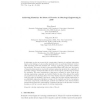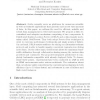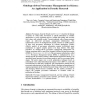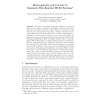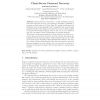OTM
2009
Springer
15 years 6 months ago
2009
Springer
108
click to vote
OTM
2009
Springer
15 years 6 months ago
2009
Springer
We present ontology databases with not-gadgets, a method for detecting inconsistencies in an ontology with large numbers of annotated instances by using triggers and exclusion depe...
119
click to vote
OTM
2009
Springer
15 years 6 months ago
2009
Springer
In this paper, we want to show which difficulties arise when automatically constructing a domain-independent knowledge base from the web. We show possible applications for such a k...
114
click to vote
OTM
2009
Springer
15 years 6 months ago
2009
Springer
Grids currently serve as platforms for numerous scientific as well as business applications that generate and access vast amounts of data. In this paper, we address the need for e...
111
click to vote
OTM
2009
Springer
15 years 8 months ago
2009
Springer
The DBpedia project extracts information from Wikipedia, interlinks it with other knowledge bases, and makes this data available as RDF. So far the DBpedia project has succeeded in...
121
click to vote
OTM
2009
Springer
15 years 8 months ago
2009
Springer
Complex event processing (CEP) is a software architecture paradigm that aims at low latency, high throughput, and quick adaptability of applications for supporting and improving ev...
131
click to vote
OTM
2009
Springer
15 years 8 months ago
2009
Springer
Provenance, from the French word “provenir”, describes the lineage or history of a data entity. Provenance is critical information in scientific applications to verify experime...
125
Voted
OTM
2009
Springer
15 years 8 months ago
2009
Springer
Abstract. The ongoing trend towards open data embraced by the Semantic Web has started to produce a large number of data sources. These data sources are published using RDF vocabul...
120
click to vote
OTM
2009
Springer
15 years 8 months ago
2009
Springer
The need for semantics preserving integration of complex data has been widely recognized in the healthcare domain. While standards such as Health Level Seven (HL7) have been develo...
